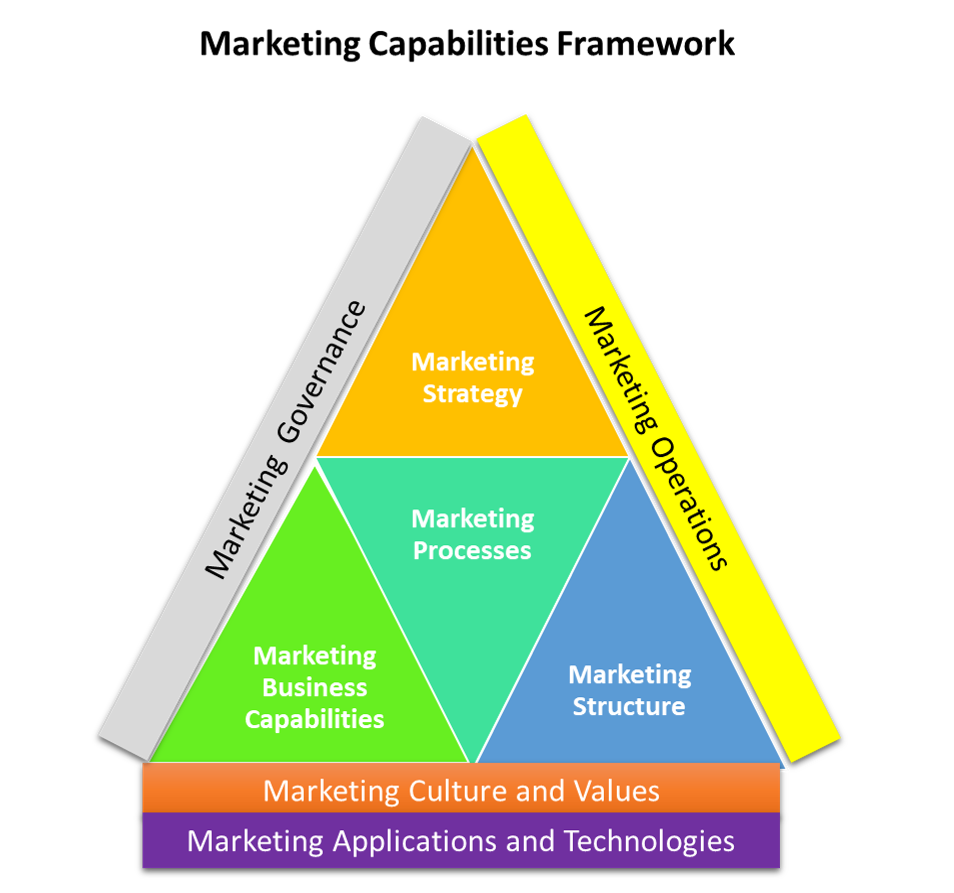Marketing Capabilities Framework
By: Ciopages Staff Writer
Updated on: Feb 25, 2023

Companies intent on leveraging marketing as a strategic advantage in the digital economy need a cohesive marketing capabilities framework. The framework identifies the key areas which are necessary – at varying levels of strength, depth, and breadth – to plan, execute and attain the marketing vision and objectives.
The marketing capabilities framework mentioned is a broader view of the abilities a company needs. However, this framework should not be confused with an overall marketing transformation framework, or the marketing business capability model. The marketing transformation framework addresses the interrelated and integrated approach to taking the marketing function to the next level. The marketing business capabilities model addresses the specific detail of what marketing does at an elemental level, and is a part of the business architecture paradigm.
Elements of the Marketing Capabilities Framework:
Marketing Strategy:
Marketing strategy is the broad area that encompasses setting the marketing vision, defining a strategy, developing tactical, operational plans, and assigning metrics. This bucket also includes market and competitive analysis. Typically, the marketing strategy is done at a business unit or enterprise level. However, if the marketing strategy is being done for a product or a service, then aspects of the marketing strategy will include the definition of the business model, identification of the value proposition, mapping customer journeys, and developing buyer personas.
Marketing Business Capabilities: Marketing business capabilities map is a decomposition of the marketing functions into its foundational entities in logical groupings. The marketing capabilities model has immense value and useful in a variety of marketing use cases.
Marketing Process Model:
The marketing processes encompass the underlying activity flows of primary value streams. Value streams are typically represented as high-level steps a stakeholder has to go thru to accomplish an outcome. A process map and a data flow diagram constitute the detailed view of the value stream.
Marketing Structure:
Marketing structure is the organizational framework of the staffing, roles, responsibilities, and levels. The marketing structure should be dependent on the marketing operating model, which in turn is influenced by the marketing strategy,
Marketing Culture and Values:
As the famous adage, attributed to Peter Drucker goes – “Culture eats strategy for breakfast,” culture and values are essential elements of a successful marketing organization. The culture and values go hand-in-hand and establish how the company’s marketing team functions and what values drive the decision-making.
Marketing Operations:
Marketing operations execute the day-to-day activities in pursuit of the marketing goals and objectives. Unless the marketing operations are humming and implementing the marketing plan efficiently and effectively, it will be difficult to realize the marketing vision and strategy.
Marketing Governance:
Marketing governance provides the guardrails and guideposts for the marketing function including measuring the progress on KPIs. In regulated industries, the governance function typically encompasses marketing compliance as well.
Marketing Systems and Technologies:
The evolution of the marketing function is driven for the most part by marketing technology platforms. In the last decade, as the digital paradigm has established as the key driver, the number and range of marketing technologies covering every field and supporting every niche have proliferated.
-
Marketing Capabilities Model: List of marketing capabilities
U.S. $699 – U.S. $1,999Category : Capability Models
View Product This product has multiple variants. The options may be chosen on the product page -
Customer Management Capabilities Model
U.S. $699 – U.S. $1,999Category : Capability Models
View Product This product has multiple variants. The options may be chosen on the product page -
CRM Capabilities Model: A matrix of customer relationship capabilities
U.S. $699 – U.S. $1,999Category : Capability Models
View Product This product has multiple variants. The options may be chosen on the product page